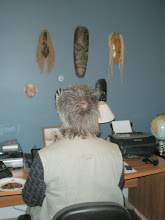"We reviewed our fears thoroughly. We put them on paper, even though we had no resentment in connection with them."
"The minute I stopped fighting or arguing I could begin to see and feel."
"We had not even prayed rightly. . . We had always said Grant me my wishes instead of Your will be done. At no time had we asked what god's will was for us; instead we had been telling him what it ought to be. It is when we try to make our will conform with god's that we begin to use it rightly. Our whole trouble had been the misuse of willpower. We had tried to bombard our problems with it instead of attempting to bring it into agreement with god's intention for us.
Here are the preconceived notions that I have about life; namely, that it's all about loss and decline, when in reality it's all about acceptance and gratitude
Some pain acceptance is going to be a good thing. It's a fact of life that there is going to be decline - I've been experiencing it in a non-catastrophic way over the last twenty years. Some decline is going to be inevitable. Something is going to get me.
Gratitude
An extensive study was done where a group of people was asked to record their thoughts about gratitude while another group wrote down the stuff that annoyed them. The results? The group that kept a Gratitude List began to report a greater sense of optimism and well-being, and the effects actually began to show up in their blood pressure and heart rate and sleep patterns. The longer the gratitude people persisted at this exercise the the more pronounced the results.
One important caveat must be pointed out: "It was not enough to be conscious of one's advantages; one had to be grateful for them. Advantages alone - even awareness of them - weren't enough, perhaps because they can be lost. Gratitude, on the other hand, was an affirmation that the world gave you things, and might continue to do so."
Happiness
Happiness shouldn't require effort on my part, and it should come as a kind of peace. All I have to do is sit back and let it wash over me. Life gives me what I need if I'm wise enough to see that.
Here's the strategy: spend my time and energy on the things that give me satisfaction, not lamenting those that I could once do - or experience - but now can't. "Selective optimization with compensation:" make the most of what I have and compensate for what I've lost.
Happiness is not something to go out and seize. Happiness is taking satisfaction in what is available right now, not hitching it to the future. Too often my definition of happiness looks forward. The future is tricky - the future might not come.
"I don’t understand happiness only as someone just always smiling and laughing. It’s more like inner happiness, where you feel you have done everything right in your life, you haven’t made anybody unhappy. You have a certain kind of peace and balance in yourself, and you are not anxious about what will happen the next minute or the next day. You let it go and you don’t worry, and you lead a balanced life. If you want the next moment where everything will be better, then you’d better do this moment right. People often asked him if he was happy, he said, and his response was always the same: of course he was.
Live in the Moment
I won’t think about what I have to do - I'm just going to do it, hoping that’s what my fate is. If I have any problems that emerge I'm going to try to leave them alone for now, let time work on it. I shouldn’t dwell on anything that's problematic - I'm going to try to leave it alone and as time goes along see if it straightens out by itself. I cannot deal with it, so you, god, now it’s your job. You work on it and I'll do something else. And usually they do it. Trust—that’s what I advise if anyone asks. You have to trust your higher power.”
It never occurred to us that we needed to change ourselves to meet conditions, whatever they were.
Sense of Purpose
Those with a sense of purpose had deteriorated little in their memory scores even when the cellular damage in the brain was identical to those with dementia.
Those with a sense of purpose had deteriorated little in their memory scores even when the cellular damage in the brain was identical to those with dementia.
Becca R. Levy, a psychiatrist at Yale, has found striking correlations between people’s attitudes toward old age and how they fare in their later years, with effects starting as early as middle age. In one study, those who had more positive views of old age, measured by how they answered the question, “When you think of old persons, what are your impressions?" tend to experience more happiness as they age.

No comments:
Post a Comment